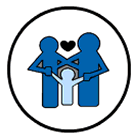Projects
Below is a comprehensive list of Large Federally Funded Projects that were previously funded or are currently funded in the lab. Currently funded projects include Project FLIGHT and Project THRIVE. All other included projects are accessible to students in the lab for additional coding of interaction and interview data, data analysis, and write up of manuscripts.
In addition to large projects in the lab, there are several graduate student run projects and intramural projects running in the lab; several of these projects are recruiting RAs and can be found under the tab “Undergraduate Students” of the “Prospective Students” section.
 Project FLIGHT 2.0
Project FLIGHT 2.0
Families Learning, Interacting, and Growing Healthy Together (COVID-19)
Formal Title: Interparental conflict and parenting in the context of COVID-19
Sponsor: Eunice Kennedy Shriver National Institute of Child Health and Human Development
Amount Funded:$3,094,499 (2022-2027)
MPIs: Melissa Sturge-Apple and Patrick Davies
- The aim of Project FLIGHT 2.0 is to explore the role the COVID-19 pandemic played in altering the nature and strength of spillover pathways between interparental conflict and parenting practices.
- The project seeks to follow 235 families who participated in three measurement occasions prior to the pandemic with additional assessments of family functioning during and following high levels of COVID-19 disease rates and restrictions.
- The multi-level methodological approach is designed to test how COVID-19 and COVID-19 related processes specifically moderate proposed spillover mechanisms mediating relations among interparental conflict and parenting, including parental cognitive self-regulation, implicit and explicit internal representations of their family relationships, and their neurobiological reactivity to family stress.
 Project THRIVE
Project THRIVE
Teamwork and Happiness in Relationships and its Intergenerational Value and Effectiveness
Formal Title: Constructive Interparental Conflict Resolution and Child Adjustment
Sponsor: Eunice Kennedy Shriver National Institute of Child Health and Human Development
Amount Funded: $2,921,624 (2018-2023)
PIs: Patrick Davies (co-I: Mona El-Sheikh)
- Project THRIVE is designed to identify how children’s processing, understanding, and emotionality in social and emotional contexts may explain why they fare so well psychologically when witnessing high levels of constructive interparental conflict.
- The final sample will consist of approximately 240 families who participate in multiple visits to the lab over a three year period beginning when children were in their last year of preschool.
- The multi-method measurement battery includes observations, surveys, and semi-structured interview assessments of family functioning, child coping with family challenges, and their psychological functioning. Additional multiple-levels-of-analysis measures also include eye tracking assessments of children’s attention and processing of social and emotional stimuli and physiological measures (i.e., respiratory sinus arrhythmia, pre-ejection period, cortisol) of children’s reactivity to challenging tasks.
 Project FLIGHT
Project FLIGHT
Families Learning, Interacting, and Growing Healthy Together
Formal Title: Interparental Relationships and Parenting
Sponsor: National Institute of Child and Human Development
Amount Funded: $2,900,000 (2016-2021)
PIs: Melissa Sturge-Apple and Patrick Davies
FLIGHT Press Release (Aug 2016)
- Project FLIGHT is a multi-method study focused on identifying how conflict between parents spills over to influence interactions within the parent-child relationship. The project will follow 250 families with a three year old child over the course of a three year period, in hopes of better understanding the impact of interparental conflict on parenting styles. Using self-reports, interparental problem-solving tasks, parent-child interaction tasks, and neurobiological assessments, Project FLIGHT plans to:
- Examine whether parent’s neurobiological responses to stress during arguments impact parent-child interactions
- Identify how positive aspects of the interparental relationship may serve as an explanation for spillover to the parent-child relationship
- Explore how parents handle conflict among themselves, and how they interact with their child as a result potential spillover
- The primary goal of our research is to determine how and why interparental conflict affects parenting skills, thus ultimately impacting the parent-child system. Understanding why this happens may lead to new interventions for helping families who experience these problems.
 Peer Ethology Project (PEP)
Peer Ethology Project (PEP)
Social Behavior in the Context of the Peer Group: The Social Defense System and Children’s Reactivity to Peer Threat
Formal Title: Ethological Analysis of Children’s Profiles of Emotional Security in Peer Contexts
Sponsor: Eunice Kennedy Shriver National Institute of Child Health and Human Development
Amount Funded: $250,000 (2012-2014)
PIs: Patrick Davies, Melissa Sturge-Apple, Dante Cicchetti, Fred Rogosch, & Meredith Martin
- The Peer Ethology Project (PEP) focuses on the application of ethological and evolutionary theory towards a more thorough understanding of the implications of social dynamics on children’s mental health. Utilizing an existing data set of video-recorded small group free-play sessions from a summer camp program for high-risk children, the research team works to identify differences in children’s behaviors and individual patterns of coping with threat and hostility in peer interactions. Specifically, our research team is focused on:
- Developing assessment tools to capture the functioning of multiple behavioral systems, particularly the social defense system, in organizing children’s behaviors with peers in the context of threat
- Identifying the complex configurations of the peer group and social environment that are likely to draw for and help to sustain particular patterns of social defense responding
- Mapping the mental health and adjustment sequelae associated with the adoption of unique strategies for coping with peer threat
- Navigating the social world of peers is a critical task for all children as well as a potential source of both stress and support. By adopting an ethological perspective, the Peer Ethology Project will provide key insights into the developmental meaning of the multitude of ways in which children cope with inevitable conflict and stress in peer relationships.
 Project BRIDGE
Project BRIDGE
Biobehavioral Research In Different Generational Experiences
Formal Title: Emotional Processes in Families: New Methods Capturing Multiple Levels of Analysis
Sponsor: Eunice Kennedy Shriver National Institute of Child Health and Human Development
Amount funded: $3,352,922 (2010-2015)
PIs: Melissa Sturge-Apple, Patrick Davies, Mark Bocko, Zeljko Ignjatovic, Wendi Heinzelman, Spencer Rosero
BRIDGE News (Aug 2010)
Wireless Communication and Networking Group BRIDGE Description
- Project BRIDGE involves a multidisciplinary team from the fields of psychology, engineering, cardiology, and communications working together to develop new methods of studying the parent-adolescent relationship within the context of the family. The project will follow a community sample of 200 middle-school students and their families through two sessions of data collection, each spaced one year apart. Project BRIDGE will be featuring several new approaches including:
- Recently-designed wireless EKG monitors and paralinguistic voice analysis systems to discreetly capture the emotional reactivity of family members as they discuss common child-related topics such as chores, curfews, and friends
- Innovative semi-structured interviews and emotion reporting techniques that get to the core of understanding parent-adolescent conflict
- Cognitive assessments and multi-faceted survey batteries that examine such topics as parenting stressors, relationship dynamics, and overall functioning
- The primary goal of our research is the creation of user-friendly and unobtrusive monitoring systems that will allow psychologists to measure behavioral and physiological responses among family members in more natural and realistic settings. In addition, we believe our findings will help better explain the evolving parent-child dynamics as children grow into teenagers.
 Project STEP
Project STEP
Successful Transitions in Ethological Perspectives
Formal Title: An Ethological Analysis of Children’s Emotional Security
Sponsor: Eunice Kennedy Shriver National Institute of Child Health and Human Development
Amount Funded: $3,109,653 (2010-2015)
PIs: Patrick Davies and Melissa Sturge-Apple
STEP Press Release (Aug 2010)
- Project STEP focuses on how young children are affected by their parents’ relationship with one another. Through following a group of 250 families with pre-school age children over a three year period, the project hopes to better understand how interparental relationship quality is linked to children’s mental health and the way the body physically reacts to stress. Using a system of observational coding, clinical interviews, and self-reports, along with cutting-edge advances like eye-tracking procedures and hormone analysis, the Project STEP team plans to:
- Explore how parents handle disagreements among themselves, how they interact with the child as a couple, and how the parents relate to their son or daughter alone
- Identify specific and distinct patterns of response reactions and coping behaviors shown by four-year-old children and how these behaviors tend to develop
- Understand how both the parents and child biologically respond to the stress caused during arguments
- Marital conflict of all levels is common in families and there are many ways that young children may choose to respond. From acting out with intense anger to displaying empathy for the situation, learning more about how children learn to cope with conflict is of key interest in our research.
 Project Connect
Project Connect
Formal Title: Dynamical Systems Tools: Modeling Multi-Level Processes in Parent-Child Relations
Sponsor: National Institute of Nursing Research
Amount Funded: $1,190,373 (2007-2011)
PIs: Melisa Sturge-Apple, Wendi Heinzelman, Zeljko Ignjatovic, Fred Rogosch, Joseph Rausch
Connect Press Release (Nov2007)
- Project Connect is a collaborative effort to develop new technologies that provide an in-depth look at how mothers and children deal with common but stressful situations associated with parenting and child development. Towards this CONNECT is focused on the following research objectives:
- Development and testing of a new system called WiPsy (Wireless technology for Psychological research). When combined with video-recording, the WiPsy system allows for the toddler-mother interaction and the stress exhibited by the toddler to be assessed through both behavioral observation and physiological analysis. The way the toddler chooses to react in these unfamiliar environments can then be considered in relation to the complexities of the early parent-child relationship.
- To delineate and understand how maternal self-regulation supports sensitive and responsive parenting behaviors and how this influences children’s own self-regulatory capacity across multiple domains of functioning
- Examine how a consideration of the larger ecological context within which mothers and children are embedded may inform these processes
- To accomplish these objectives, Project CONNECT utilized an innovative battery of assessments as well as observational coding and clinical interviews with a socioeconomically diverse sample of 185 mothers and their child.
 Project FUTURE
Project FUTURE
Families Understanding Toddlers’ Unique Relationship Experiences
Formal Title: Domestic Violence, Child Security, and Child Mental Health
Sponsor: National Institute of Mental Health
Amount Funded: $2,777,599 (2004-2010)
PIs: Patrick Davies and Dante Cicchetti
FUTURE Press Release (Mar 2005)
- Project FUTURE is a pioneering study designed to examine how children handle and adjust to a wide array of conflict patterns between their parents, ranging from constructive conflict characterized by cooperation and resolution to destructive conflict characterized by violence and hostility.
- Over 200 Rochester-area mothers and toddlers participated in the project over a three-year period, beginning when the child was 2 years old. Families reported experiencing varying levels of destructive and constructive conflict, including some domestic violence.
- During the annual mother-child research sessions, multiple domains of functioning were assessed including:
- Interparental relationships and conflict
- Parenting abilities, adjustment, and psychopathology
- Family characteristics and overall functioning
- Children’s mental well-being and health
- Children’s coping and adaptation to specific family relationships
- Children’s temperamental, biological, and genetic characteristics
- Project FUTURE seeks to identify the pathways involved in the link between the ways parents approach their conflicts and young children’s adaptation within the framework of the emotional security theory. More specifically, the researchers are continuing to process the rich array of information collected to explain how and why children exposed to destructive interparental conflict are at an increased risk for experiencing mental illness later in life and to identify the family and child characteristics that may serve as sources of resilience or additional risk for children in these families.
 Me and My Family Project
Me and My Family Project
Formal Title: Family Process, Emotional Security, and Child Adjustment
Sponsor: National Institute of Mental Health
Amount Funded: Phase 1 ($1,878,816 1999-2005) and Phase 2 ($3,164,171 2006-2011)
PIs: Patrick Davies, E. Mark Cummings, Dante Cicchetti
- The Me and My Family Project is a long-term study designed to explore children’s security in the family with an emphasis on the relationship between child adjustment and marital conflict. The project is jointly conducted at the University of Rochester and University of Notre Dame. With the final family research session completed in late 2010, the staff continues to process, code, and analyze the vast array of data collected and prepare their findings for presentation and publication.
- Starting in 1999, Phase 1 of the project included 235 families with children in kindergarten. Mothers, fathers, and children participated in a multiple levels of analysis measurement battery over three annual measurement occasions until the child was in 2nd – 3rd grade. When the children entered middle school, another three wave phase of data collection began, examining family and child functioning as children progressed through early adolescence.
- In 2006, an additional 85 families with 7th grade students enrolled in the project, bringing the total number of families involved with the Me and My Family Project to more than 320.
- During the six waves of data collection, a variety of innovative observational, interview, analog, self-report, and physiological measures were used to assess children’s emotional security and reactions to interparental conflict, children’s adjustment, and broader indices of family functioning.
- In Phase 2, the measurement battery was expanded to include teacher reports, molecular genetics assays, and additional measures of children’s peer and dating relationships, sibling experiences, and neuropsychological functioning. The second phase of the project will therefore allow for a more comprehensive assessment of functioning and afford the opportunity to address questions about how children’s adjustment varies as a function of the interplay between early and later experiences in the family.
- While the quality of marital relations has long been known to affect family functioning and child development, there is little understanding of the specific processes by which marital relations impact families and children.
- The Me and My Family Project was designed to identify these processes in the context of a family-wide model that incorporates mother-child and father-child relationships, parent adjustment and psychopathology, children’s coping and adjustment in family relationships, and their overall development, including their school adjustment, social functioning, peer relationships, and psychological symptoms.
- Plans are in place to follow up with families as the children transition into adulthood.
